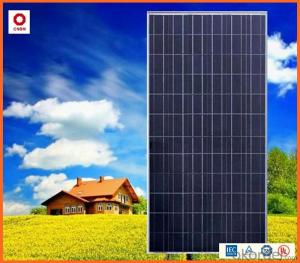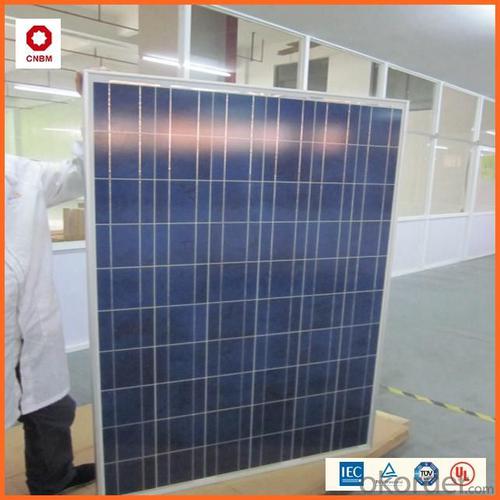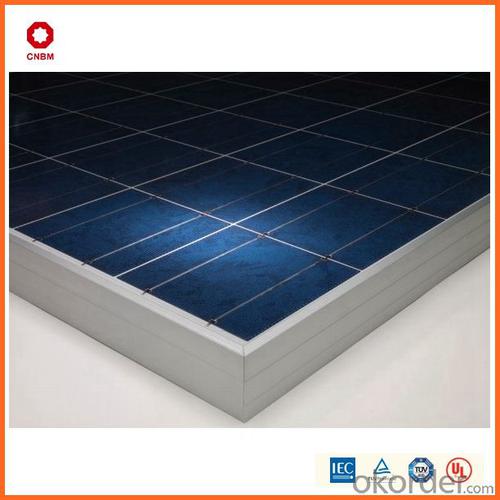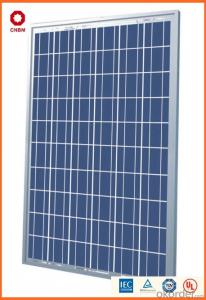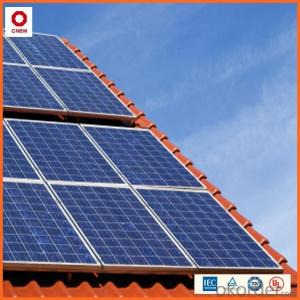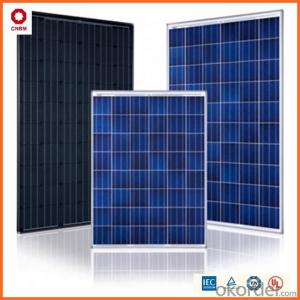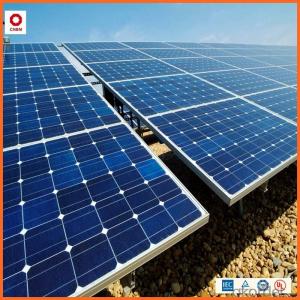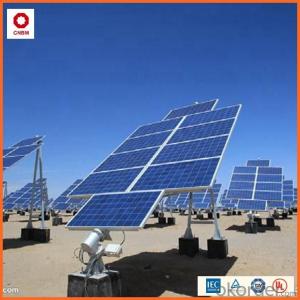Sirius Solar Energy Systems ☆☆☆Hot Sale 245W Poly Solar Panel On Stock 0.45/W!!!!☆☆☆ A Grade Good Quality
- Loading Port:
- China main port
- Payment Terms:
- TT OR LC
- Min Order Qty:
- 8000 watt
- Supply Capability:
- 10000000 watt/month
OKorder Service Pledge
OKorder Financial Service
You Might Also Like
Product Description:
Hot Sale !!! Quality and Safety of 245w-320w Poly Solar Panel
1. Rigorous quality control meets the highest international standards.
2. High-transmissivity low-iron tempered glass, strong aluminium frame.
3. Using UV-resistant silicon.
4. IS09001/14001/CE/TUV/UL
Warranties of 245w-320w Poly Solar Panel
1. 10 years limited product warranty
2. 15 years at 90% of the minimal rated power output
3. 25 years at 80% of the minimal rated power output
Technical date of 245w-320w Poly Solar Panel
ITEM NO.: | Mono 125*125 cell ,36pcs . Power range from 80Wp-100Wp | ||||||||
Maximum Power(W) | 80 | 85 | 90 | 95 | 100 | ||||
Optimum Power Voltage(Vmp) | 17.81 | 17.89 | 17.94 | 17.99 | 18.06 | ||||
Optimum Operatige Current(Imp) | 4.78 | 4.91 | 5.12 | 5.35 | 5.59 | ||||
Open Circuit Voltage(Voc) | 21.98 | 22.05 | 22.14 | 22.28 | 22.45 | ||||
Short Circuit Current(Isc) | 4.95 | 5.15 | 5.36 | 5.65 | 5.84 | ||||
Solar Cell: | 125*125 Mono | ||||||||
Number of Cell(pcs) | 4*9 | ||||||||
Brand Name of Solar Cells | JA Cell, Bluesun Cell | ||||||||
Size of Module(mm) | 1580*808*35 | ||||||||
Caple & Connector Type | Pass the TUV Certificate | ||||||||
Frame(Material Corners,etc.) | Aluminium-alloy | ||||||||
Backing (Brand Type) | TPT | ||||||||
Cell Efficiency for 100W(%) | 15.8% | ||||||||
Weight Per Piece(KG) | 12.0KG | ||||||||
FF (%) | 70-76% | ||||||||
Junction Box Type | Pass the TUV Certificate | ||||||||
Tolerance Wattage(e.g.+/-5%) | ±3%, or 0-3% | ||||||||
Front Glass Thikness(mm) | 3.2 | ||||||||
Temperature Coefficients of Isc(%) | +0.04 | ||||||||
Temperature Coefficients of Voc(%) | -0.38 | ||||||||
Temperature Coefficients of Pm(%) | -0.47 | ||||||||
Temperature Coefficients of Im(%) | +0.04 | ||||||||
Temperature Coefficients of Vm(%) | -0.38 | ||||||||
Temperature Range | -40°C to +85°C | ||||||||
Surface Maximum Load Capacity | 2400Pa | ||||||||
Allowable Hail Load | 23m/s ,7.53g | ||||||||
Bypass Diode Rating(A) | 12 | ||||||||
Warranty | 90% of 10 years,80% of 25 years. | ||||||||
Standard Test Conditions | AM1.5 1000W/ 25 +/-2°C | ||||||||
Packing | carton or pallet | ||||||||
1*20' | 25 Pallets / 450pcs | ||||||||
1*40'STD | 25 Pallets / 100pcs | ||||||||
Features of our products:
• High conversion efficiency mono/poly-crystalline amorphous silicon solar cells
• Modules incorporate high performance bypass diodes to minimize the power drop caused by shading
• High transmittance, low-iron tempered glass
• High performance EVA encapsulant to prevent destroying and water.
• AI frame: without screw, corner connection. 8 holes on the frame can be installed easily
• Good performance of preventing from atrocious weather such as wind and hails
• Certifications: CE IEC TUV VDE UL, Class I
• 10 years 90% power output warranty

Shipping of 245w-320w Poly Solar Panel
By Sea | Delivery from Shanghai or Ningbo seaport |
By Air | Departure from Shanghai Pudong Airport |
By Express | Post by DHL, EMS, UPS, TNT. |
- Q: Can solar energy systems be used for powering water treatment plants?
- Certainly, water treatment plants can utilize solar energy systems. Indeed, solar power is increasingly being employed as an eco-friendly and economical solution for powering various industrial processes, including water treatment. Photovoltaic (PV) panels can harness solar energy to generate electricity, which can then be utilized to operate the water treatment plant. Using solar energy for water treatment plants offers several advantages. Firstly, solar power is a plentiful and renewable energy source, meaning it does not deplete natural resources and is widely available. This makes it an exceptionally sustainable choice for powering water treatment plants, particularly in regions with ample sunlight. Additionally, solar energy systems have a minimal environmental impact compared to traditional fossil fuel-based power sources. They do not produce any greenhouse gas emissions during operation, thereby reducing the carbon footprint of the water treatment plant and contributing to overall environmental preservation. Moreover, solar power can provide a dependable and consistent energy source for water treatment plants. Advancements in energy storage technologies, such as batteries, enable excess energy generated during the day to be stored and utilized during periods of low sunlight or high energy demand. This ensures a continuous and uninterrupted power supply for the water treatment plant, even in cloudy or nighttime conditions. Furthermore, solar energy systems can significantly decrease operating costs for water treatment plants. Once the initial investment in solar panels and associated equipment is made, the operational costs become minimal. This is due to the fact that sunlight, the fuel for solar energy, is free. Consequently, the reliance on expensive and limited fossil fuels for electricity generation is eliminated, resulting in long-term cost savings for the water treatment plant. In summary, solar energy systems are a suitable and efficient option for powering water treatment plants. They offer numerous benefits, including sustainability, environmental friendliness, reliability, and cost-effectiveness. As the world continues to prioritize renewable energy sources, the integration of solar power into water treatment plants will likely become increasingly prevalent.
- Q: What is the average payback period for a solar energy system?
- The average payback period for a solar energy system varies depending on various factors such as the initial cost of the system, location, energy usage, available incentives, and financing options. However, on average, it typically ranges from 5 to 10 years.
- Q: Can solar energy systems be used for powering hotels?
- Hotels can definitely use solar energy systems to power their operations. In fact, many hotels worldwide are already utilizing solar power to fulfill their energy requirements. Solar energy systems, such as PV panels or solar thermal systems, can be installed on hotel rooftops or surrounding land to capture the sun's power and convert it into electricity or heat. Solar power offers numerous advantages for hotels. Firstly, it is a clean and sustainable energy source, contributing to reduced carbon footprints and promoting sustainable practices. By utilizing solar energy, hotels can significantly decrease their dependence on fossil fuels and lower greenhouse gas emissions. Secondly, solar energy systems provide hotels with energy independence and reduce reliance on the grid. This is especially beneficial in remote areas or during power outages, as hotels can seamlessly continue operations with their own power supply. Additionally, surplus energy generated by solar panels can be stored in batteries for use during nights or cloudy days. Moreover, installing solar panels can be a wise financial decision for hotels. While initial installation costs may be high, solar energy systems have long lifespans and can result in substantial savings on electricity bills over time. In certain cases, hotels can even sell excess energy back to the grid, generating additional revenue. Lastly, solar power can enhance a hotel's reputation and attract environmentally-conscious guests. Many travelers actively seek eco-friendly accommodation options, and hotels utilizing solar energy can position themselves as sustainable and socially responsible. In conclusion, solar energy systems can certainly power hotels, offering clean, renewable, and cost-effective energy sources. They provide energy independence, financial benefits, and enhance a hotel's reputation. As the world moves towards a more sustainable future, solar power has become an increasingly popular choice for hotels seeking to minimize their environmental impact and efficiently meet their energy needs.
- Q: Can solar energy systems be used in powering street lights?
- Indeed, street lights can be powered by solar energy systems. In recent years, the popularity of solar-powered street lights has increased significantly due to their numerous advantages. By utilizing solar panels, sunlight is converted into electricity, which is then stored in batteries for later use. This stored energy is subsequently employed to illuminate the street lights during the night. There are various benefits associated with utilizing solar energy systems for street lights. Firstly, it offers a clean and renewable energy source, thereby reducing reliance on fossil fuels and minimizing the carbon footprint. Additionally, solar street lights eliminate the need for extensive cabling and grid connections, making them more cost-effective and easier to install in remote or off-grid areas. Moreover, solar-powered street lights operate independently of the electricity grid, ensuring continuous lighting even during power outages. Furthermore, solar-powered street lights are highly efficient and require minimal maintenance. The advancements in solar technology have enhanced the panels' ability to convert sunlight into electricity, ensuring optimal performance of the street lights. Furthermore, the batteries used to store solar energy have a long lifespan and necessitate minimal upkeep, thereby reducing overall operational costs. In conclusion, solar energy systems offer a sustainable and viable solution for illuminating street lights. They provide reliable and uninterrupted lighting while decreasing the environmental impact and operating expenses associated with traditional grid-powered street lights.
- Q: Can solar energy systems be used in areas with limited grid infrastructure?
- Solar energy systems are indeed suitable for use in areas that have limited grid infrastructure. In fact, one of the key benefits of solar energy is its ability to supply electricity in remote and off-grid locations. By converting sunlight into energy, solar panels generate electricity without relying on a connection to the traditional power grid. This makes solar energy systems an ideal choice for remote areas like rural communities or developing regions, where it may not be financially or technically feasible to extend the grid infrastructure. Through the installation of solar panels and the use of energy storage systems like batteries, these areas can generate and store their own electricity, even when sunlight is scarce or during nighttime. This not only grants access to reliable and clean energy, but also fosters energy independence and resilience in regions with limited grid infrastructure. Moreover, solar energy systems can be easily adjusted in scale to meet the energy demands of the community, making them a versatile and sustainable solution for powering areas with limited grid infrastructure.
- Q: Can solar energy systems be used for powering off-grid educational institutions?
- Yes, solar energy systems can indeed be used for powering off-grid educational institutions. Solar panels can be installed on the rooftops of buildings to harness the sun's energy and convert it into electricity. This renewable energy source can then be used to power various electrical appliances, lighting, and other necessities within the educational institution. By utilizing solar power, off-grid educational institutions can reduce their dependence on traditional energy sources and contribute to a more sustainable and environmentally friendly way of generating electricity.
- Q: How do solar energy systems impact the electricity generation mix?
- Solar energy systems have a significant impact on the electricity generation mix as they contribute to the diversification of the energy sources. By harnessing the power of the sun, solar systems reduce the reliance on fossil fuels, leading to a decrease in greenhouse gas emissions and a transition towards cleaner and more sustainable electricity generation. Solar energy systems also enable decentralized power generation, allowing for increased energy independence, grid stability, and resilience. Overall, the integration of solar energy systems into the electricity generation mix promotes a more balanced and environmentally friendly energy portfolio.
- Q: Are there any government grants or funding options for solar energy systems?
- Yes, there are various government grants and funding options available for solar energy systems. These can include federal, state, and local incentives, tax credits, loans, and grants specifically designed to promote the adoption of renewable energy sources like solar power. These funding options aim to encourage individuals, businesses, and organizations to invest in solar energy systems and help accelerate the transition to clean and sustainable energy.
- Q: Can a solar energy system be used off-grid?
- Certainly! A solar energy system has the capability to function without being connected to the main power grid. Stand-alone systems, also referred to as off-grid systems, are specifically designed to generate and store electricity in regions that do not have access to the conventional power grid. These systems typically comprise of solar panels, a battery bank, and an inverter. Throughout the day, the solar panels convert sunlight into electricity, which can then be utilized to power various appliances, lights, and other electrical devices. Any surplus energy is stored in the battery bank for usage during periods without sunlight or during the night. Off-grid solar energy systems are extremely beneficial in remote areas or places where access to the power grid is unreliable or non-existent, as they provide a sustainable and self-sufficient source of electricity.
- Q: Are there any risks of electrical overloading with solar energy systems?
- Yes, there are risks of electrical overloading with solar energy systems. If the solar panels generate more electricity than what the system can handle or the electrical load can absorb, it can lead to overloading. This can cause damage to the system components, electrical fires, or even electric shock hazards. It is crucial to properly size the solar energy system and ensure the electrical infrastructure is designed to handle the generated power to mitigate these risks.
Send your message to us
Sirius Solar Energy Systems ☆☆☆Hot Sale 245W Poly Solar Panel On Stock 0.45/W!!!!☆☆☆ A Grade Good Quality
- Loading Port:
- China main port
- Payment Terms:
- TT OR LC
- Min Order Qty:
- 8000 watt
- Supply Capability:
- 10000000 watt/month
OKorder Service Pledge
OKorder Financial Service
Similar products
Hot products
Hot Searches
Related keywords


